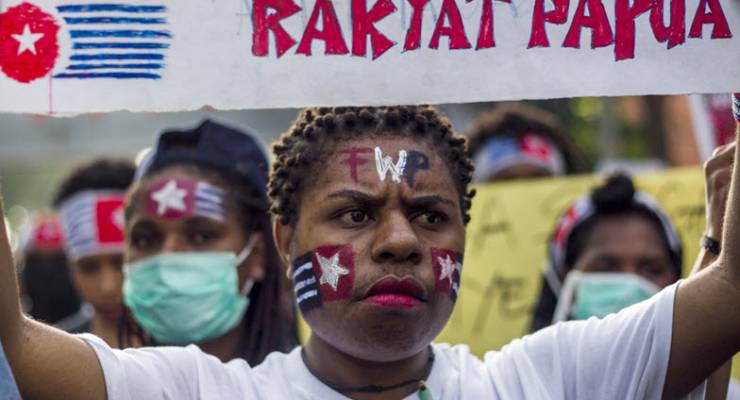
West Papua is in turmoil with the killing of 31 construction workers and a soldier, widespread protests and the arrest of 537 West Papuan activists across Indonesia. These events follow what West Papuan sources say have been the killing of numerous villagers in recent weeks.
Taken together, these events mark a significant escalation of the otherwise low-level conflict. In September, 1.7 million Papuans signed a petition calling for an act of self-determination, indicating that the desire for independence among indigenous West Papuans is as strong as ever.
The Indonesian government has blamed West Papuan separatists for the killing of the construction workers, most of whom were from Sulawesi, and a soldier on Sunday. Reports say that the construction workers angered locals by taking photographs of a protest on Saturday that marked the 1961 West Papuan declaration of independence, two years before Indonesia occupied the territory.
Indonesian military spokesman Colonel Muhammad Aidi said the incident occurred after members of an “armed criminal separatist group” held a ceremony to commemorate the 1961 declaration. He said that one of the construction workers a company building a bridge in remote region of West Papua took photographs of the protesters, which triggered the attack the following day.
Troops and police who went to investigate the attack were fired on, leaving one soldier dead and another wounded. United Liberation Movement for West Papua chairman Benny Wenda said there had been numerous clashes between the West Papua Liberation Army and Indonesian forces recently. “Bombing, burning houses, and shooting into villages from helicopters are acts of terrorism,” he said of the Indonesian military’s activities.
The West Papua Liberation Army had not previously been active in the Nduga-Wamena region where the attack took place and had no history of such attacks. However, the area is well known for clan violence. A self-described “faction” of the Liberation Army has, however, claimed responsibility for the attack.
There have also been past acts of violence undertaken by aggrieved locals. In at least one other case, too, a 2010 attack against a mine worker convoy was later shown to have been fomented by the Indonesian military seeking to restore their declining role.
Last Saturday marked widespread protests across Indonesia by West Papuan students and other activists. The protests called for a vote on self-determination in West Papua.
The protests follow the reorganisation of West Papuan activist groups in February under the umbrella United Liberation Movement for West Papua (ULMWP). There has been an upsurge in activism since the formation of the ULMWP.
Protests by around 300 West Papuan students in the Javanese port city of Surabaya on Saturday was met by at least as many paramilitary police and soldiers, and a nationalist counter-demonstrators who threw rocks and sharpened bamboo poles. Footage of that protest shows several injured people, with others being arrested.
In 2015, Indonesian President Joko Widodo declared that West Papua would be opened to outsiders, including the international community. However, the Indonesian military quickly contradicted Widodo’s proposal and the territory has remained all but closed to outside access, and foreign journalists remain restricted.
Papua has vast natural resources, including the world’s largest gold and second largest copper deposit at the $100 billion Freeport mine, but remains the poorest province in Indonesia. Low-level violence has continued in West Papua since the mid-1960s, in the past punctuated by major human rights violations of West Papuans by the Indonesian army and police.
Damien Kingsbury is Deakin University’s professor of international politics.








This was an invasion by Indonesia that Australia, Netherlands and UN sat back and let happen, as they thought it sufficient reparation for former colonization of the Indonesia by the Dutch.
Of course the West Papuans POV was not taken into account and it is glaringly obvious that a culture that treasures pigs and gets around in penis gourds and ass grass would blend perfectly with the worlds largest muslim nation.
Indonesia has no claim at all on Papua, we just let them have it.
I agree with you NgGJB. The more we pander to the Indonesians the worse they get. It is well known the atrocities the Indonesians commit in West Papua yet we turn a blind eye in the vain hope that Indonesia will be friends. How many examples of their ugly nature do we need to see that appeasement is counterproductive to a genuine friendship?
One of Sukarno’s definitions in demands for independence from the Netherlands was that the cultural links & traditions, ethnicity and religions made the people of Indonesia one.
It wasn’t true then nor now but in no way could that have applied to West Papua.
As with Timor, it suited the Hegemon because of oil & mining projects (Freetown in basically one of the world’s largest mines with people living in & around it to keep it functioning.)
Australia just went along with what the big players said, Silver Ming was not one for upsetting imperial apple carts.